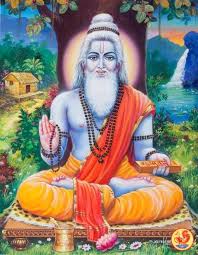
兩族背景與教育
俱盧國王持國有一百個兒子,稱為俱盧百子。他已故的弟弟般度有五個兒子,稱為般度五子(堅戰、怖軍、阿朱那、無種和偕天)。兩族都在智者毗濕摩和德羅納的教導下,學習戰爭藝術與各種知識,然而般度族在德行和技藝上更為傑出。
難敵的嫉妒與陰謀
隨著歲月流逝,俱盧族最年長的難敵對般度族日漸增長的聲望感到嫉妒。他與邪惡的叔叔沙恭尼合謀,圖謀奪取般度族的財富和王位。
與《吠陀經》和《奧義書》等許多古印度經典一樣,《薄伽梵歌》的確切作者身份在歷史上並不完全清晰。然而,根據印度悠久的傳統,這部經典普遍被歸功於一位名叫廣博仙人 (Vyasa) 的聖者。 廣博仙人不僅被視為《薄伽梵歌》的編纂者,他更像是一個傳奇性的文化英雄而非單一的歷史人物。他被認為是古代知識和智慧的集大成者,同時也是巨著《摩訶婆羅多》的編者,而《薄伽梵歌》正是《摩訶婆羅多》中的一部分。 在《薄伽梵歌》寫作的那個時代,禁慾主義在印度被廣泛視為一種理想的靈性生活方式,認為唯有捨棄世俗才能達到解脫。 《薄伽梵歌》挑戰了當時普遍的觀念,即只有苦行者和僧侶才能通過徹底的放棄來實現完美的靈性生活。 在深入故事之前,讓我們先認識兩位主要角色: 般度族中最偉大的弓箭手和領袖,一位技藝高超、品德高尚的剎帝利(戰士統治者種姓)。他以其勇氣、公正和對正法的堅守而聞名。在戰場上面對親友時,他陷入了深刻的道德與情感困境,這促使了《薄伽梵歌》的智慧對話。 在故事中,他既是阿朱那的表兄弟、摯友,也是他的馬車夫。然而,他的真實身份是至高無上的神祇,化身為人來到世間。他扮演著阿朱那導師的角色,引導他穿越困惑,領悟宇宙的真理與靈性法則。 《薄伽梵歌》的情節圍繞著爭奪王位的兩支堂兄弟家族:般度族 (Pandavas) 和俱盧族 (Kauravas)。 由於外交手段的徹底失敗,這兩個家族的軍隊在戰場上相遇,旨在透過武力解決衝突,並決定哪一方將獲得王位。 阿朱那 (Arjuna),般度族中最偉大的弓箭手和領袖,是一位剎帝利(戰士統治者種姓)的成員。當他環顧對手陣營,赫然發現許多朋友、親戚、昔日恩師,以及眾多至親好友都身處敵對一方時,他感到極度的悲傷與困惑,並拒絕戰鬥。 奎師那 (Krishna) 見到阿朱那放棄戰鬥的意圖,便開始勸說他,闡明他身為戰士應當恪守職責,與敵人交戰。薄伽梵歌:作者、主題與故事背景
作者身份
主題與故事背景
「你從未誕生;你永不死亡。你從未改變;你永不改變。」—《薄伽梵歌》
核心人物簡介
故事背景與情節
點擊標題或事件查看更多詳情。

俱盧國王持國有一百個兒子,稱為俱盧百子。他已故的弟弟般度有五個兒子,稱為般度五子(堅戰、怖軍、阿朱那、無種和偕天)。兩族都在智者毗濕摩和德羅納的教導下,學習戰爭藝術與各種知識,然而般度族在德行和技藝上更為傑出。
隨著歲月流逝,俱盧族最年長的難敵對般度族日漸增長的聲望感到嫉妒。他與邪惡的叔叔沙恭尼合謀,圖謀奪取般度族的財富和王位。

在沙恭尼的詭計下,難敵誘使堅戰參與一場骰子遊戲。由於沙恭尼作弊,堅戰不僅輸掉了般度王國,也導致般度族被放逐了13年。

流放期滿後,般度族歸來並要求歸還王位。奎師那作為般度族的表兄,前往持國國王和難敵處進行和平斡旋,甚至提出只給般度族五座城市即可。然而,難敵傲慢地拒絕了所有和解提議,聲稱連針尖大的土地都不會給般度族,使得和平的所有可能性徹底破滅。
和平談判失敗後,奎師那回到般度族身邊,告知他們除了透過武力解決衝突,已別無選擇。面對難敵的頑固,般度族別無選擇,決定為爭奪屬於他們的王位而戰,兩軍為決戰做好了準備。

般度族與他們的盟友集結於俱盧之野,擺開陣勢面對俱盧族大軍。作為般度族中最偉大的弓箭手和領袖,阿朱那率領般度大軍,由奎師那親自擔任他的馬車夫。
阿朱那請求奎師那將戰車駛向兩軍中央,以便看清敵人。當他環顧對手陣營,赫然發現許多朋友、親戚、昔日恩師,以及眾多至親好友都身處敵對一方時,他陷入了極度的悲傷與道德困惑,並拒絕戰鬥,質疑為了王國而與親族戰鬥的意義。

見到阿朱那放棄戰鬥的意圖,奎師那開始勸說他,闡明他身為一位剎帝利(戰士統治者種姓)應當恪守職責,為正義而戰。他強調應關注行動本身而非結果,因為結果不在人的掌握之中。然而,阿朱那仍被必須與師長親友戰鬥的困擾所束縛,向奎師那懇求更深的指導。
奎師那於是深入闡釋了靈魂的永恆不朽,超越肉體的生滅。他教導阿朱那如何透過「瑜伽」(與真我的合一)達到對至高存在的覺悟,意識到神性顯現於萬物之中,並超越世俗的二元對立。最終,奎師那向阿朱那揭示了其至高無上的神聖形態,展示了宇宙萬象皆是其一體示現,指引阿朱那放下自我,相信祂,從而擺脫執著與罪惡。

在領受了奎師那的神聖教誨並見證其宇宙形態後,阿朱那終於克服了內心的恐懼與絕望。他領悟到作為一位剎帝利(戰士統治者種姓)的職責,並決定履行天命,將自己完全奉獻給神。帶著堅定的決心,阿朱那拿起他的弓,射出開戰的第一箭,標誌著俱盧之野大戰的正式拉開序幕。

Similar to many ancient Indian scriptures like the Vedas and the Upanishads, the exact authorship of the Bhagavad Gita is not historically clear. However, according to long-standing Indian tradition, this sacred text is widely attributed to a revered sage known as Vyasa.
Vyasa is not merely considered the compiler of the Bhagavad Gita; he is more akin to a legendary cultural hero rather than a single historical figure. He is believed to be the great compiler of ancient knowledge and wisdom, and the editor of the epic Mahabharata, of which the Bhagavad Gita forms a crucial part. Thus, Vyasa’s stature in Indian culture is often compared to that of the great author of ancient Greek epics like the Iliad and the Odyssey—Homer. He symbolizes the transmission of wisdom and the systematization of knowledge.
During the time the Bhagavad Gita was written, asceticism – a life of severe self-discipline and abstention from all forms of indulgence – was widely considered the ideal spiritual path in India. The common belief was that only by completely renouncing the world could one achieve spiritual liberation.
“You were never born; you will never die. You have never changed; you will never change.” —The Bhagavad Gita
However, the Bhagavad Gita challenges this prevailing idea, revolving around a central question: How can a person live a spiritually meaningful life without withdrawing from society? Is there a right path for those who don’t want to abandon their family and social duties? The “Song of God” dares to question the general consensus that only renunciates and monks could achieve perfection through abandonment.
Before diving into the story, let’s meet the two main characters:
The plot of the Bhagavad Gita revolves around the struggle for the throne between two cousin families: the Pandavas and the Kauravas.
After all attempts at diplomatic resolution failed, the armies of these two clans met on the battlefield to settle their conflict by force and determine which side would claim the kingdom.
Arjuna, the great archer and leader of the Pandavas, a member of the Kshatriya (warrior-ruler caste), looked across at the opposing army. When he recognized his friends, relatives, former teachers, and indeed many dear ones on the enemy side, he became deeply distressed and confused, refusing to fight. Krishna, witnessing Arjuna’s resolve to withdraw, began to persuade him, explaining why he should uphold his duty as a warrior and engage in battle. Thus, the Bhagavad Gita is a dialogue between Arjuna and Krishna – a seeker and one who possesses ultimate knowledge and divine wisdom.